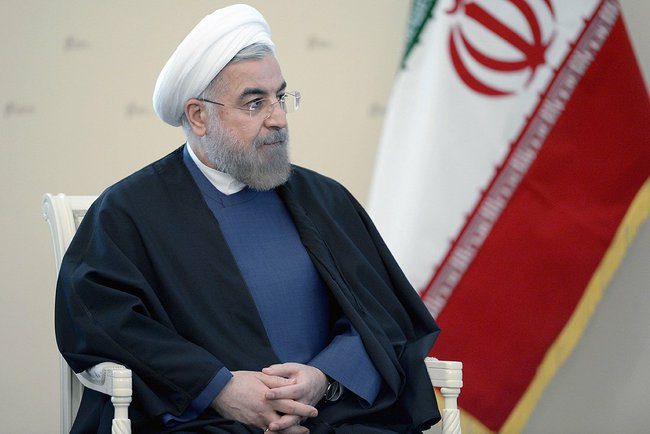The news comes ahead of the deadline set by Tehran to expel the United Nations’ inspectors unless Washington lifts all sanctions on the Islamic Republic.
Iran said it is “positive” that the US sanctions “would soon be lifted”, Reuters reported, as the head of the United Nation’s nuclear agency began talks in the Iranian capital on Sunday.
“We predict with confidence that diplomatic initiatives will result in a favourable outcome despite the diplomatic wrangling, which are a natural prelude to the return of the parties to their commitments, including the lifting of all sanctions in the near future,” Cabinet Government Spokesman Ali Rabiei was quoted as saying.
The remarks came after the head of the International Atomic Energy Agency [IAEA], Rafael Grossi arrived in Iran on Saturday, just hours ahead of a deadline set by the Islamic Republic to expel the United Nations’ [UN] inspectors assigned to monitor its nuclear activity.
On Sunday, Grossi met with the head of the Iran’s Atomic Energy Organisation, Ali Akbar Salehi. He is also scheduled to meet President Hassan Rouhani as well as Iran’s Foreign Minister Mohammad Javad Zarif.
“In my opinion, the IAEA’s inspection capability will be reduced by about 20-30 percent after the implementation of the parliament’s law on Tuesday”, deputy foreign minister Abbas Araghchi said in an interview on Saturday night.
Read also: Qatar to ‘spare no efforts’ to help revive US-Iran nuclear deal
Iran previously stated that it will expel the UN team unless the US lifts all sanctions on the Islamic Republic.
Meanwhile, Fada Hossein al-Maliki, a member of Iran’s National Security Commission told Al Araby Al Jadeed that “Qatari and European contacts” are working with the US and Iran to revive the nuclear deal.
If sanctions are lifted on Iran, Tehran will return to its nuclear commitments in accordance with the 2015 accord.
Speaking to Doha News, Director of the Gulf Studies Centre at Qatar University Dr. Mahjoob Zweiri said former US President Donald Trump’s harsh approach to its rival led it to increase its nuclear activities.
“Trump’s ‘maximum pressure’ method impelled Iran to violate the nuclear deal’s prevailing limitations. Dr. Zweiri said.
“Iran has increased its uranium enrichment and stockpiling rates significantly past JCPOA permits,” he added.
However, uncertainties remain over President Biden’s “path back to diplomacy” for Iran.
“Based on Iran’s progression on the nuclear front, it will be challenging to return to the terms of the JCPOA. New negotiations will need to address the imminent threat of a nuclear weapons armed Iran,” Dr. Zweiri added.
The new Biden administration has in recent weeks been pushing for the return of the accord as part of his efforts in possibly reversing former Trump Administration’s policies.
Signed between Iran and the P5+1 – China, France, Russia, the United Kingdom, the United States, and Germany – the deal limited Tehran’s nuclear weapon production in exchange for the lifting of sanctions on the country.
Trump’s 2018 withdrawal of the deal also brought along with it stifling sanctions on Iran that significantly increased tensions between Washington and and its rival.
Qatar mediation
As diplomatic efforts gain speed, Qatar is at the heart of talks to mediate between the two rivals.
Last year, the Gulf state was able to calm heightened tensions following the assassination of Iranian General Qassem Soleimani. At the time, the incident raised fears of military escalation.
More recently, Qatar’s Minister of Foreign Affairs Sheikh Mohammed bin Abdulrahman Al Thani said his country will “spare no efforts” in its mediation efforts between the United States and Iran.
“We hope that with the return of the US to the nuclear deal as soon as possible, challenges and sanctions can be alleviated within the framework of the deal, and Qatar will not spare any efforts to make that happen,” Al Thani said during the first high-level talks in Tehran last week.
Read also: Could Qatar’s strategic location help allay US-Iran tensions?
Experts believe that while Doha’s role will not be easy, its geographic location and its strong relations with Tehran and Washington will possibly lead to a more positive path.
“It should be understood that Qatar’s role here is not going to be easy, but its geographic location, its hosting of American troops, and its importance for security for the GCC countries necessitate its full engagement,” Dr. Imad Harb, Director of Research, Arab Center in Washington DC, told Doha News.
Follow Doha News on Twitter, Instagram, Facebook and Youtube







